实验四
实验任务1.1
实验代码
#include <stdio.h>
#define N 4
int main() {
int a[N] = {2, 0, 2, 3};
char b[N] = {'2', '0', '2', '3'};
int i;
printf("sizeof(int) = %d\n", sizeof(int));
printf("sizeof(char) = %d\n", sizeof(char));
printf("\n");
for (i = 0; i < N; ++i)
printf("%p: %d\n", &a[i], a[i]);
printf("\n");
for (i = 0; i < N; ++i)
printf("%p: %c\n", &b[i], b[i]);
printf("\n");
printf("a = %p\n", a);
printf("b = %p\n", b);
return 0;
}
实验结论
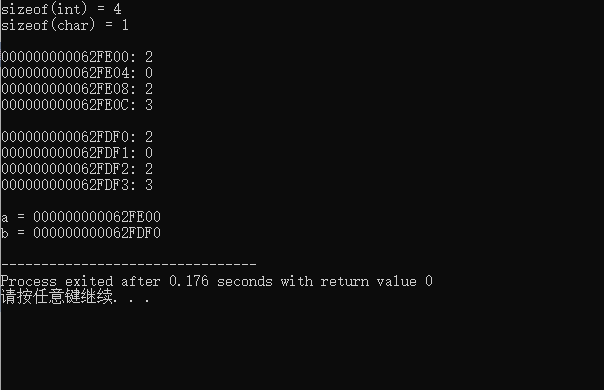
回答问题
1.连续,4个字节
2.连续,1个字节
3.一样,一样
实验任务1.2
实验代码
#include <stdio.h>
#define N 2
#define M 3
int main() {
int a[N][M] = {{1, 2, 3}, {4, 5, 6}};
char b[N][M] = {{'1', '2', '3'}, {'4', '5', '6'}};
int i, j;
for (i = 0; i < N; ++i)
for (j = 0; j < M; ++j)
printf("%p: %d\n", &a[i][j], a[i][j]);
printf("\n");
printf("a[0] = %p\n", a[0]);
printf("a[1] = %p\n", a[1]);
printf("\n");
for (i = 0; i < N; ++i)
for (j = 0; j < M; ++j)
printf("%p: %c\n", &b[i][j], b[i][j]);
printf("\n");
printf("b = %p\n", b);
printf("b[0] = %p\n", b[0]);
printf("b[1] = %p\n", b[1]);
printf("\n");
return 0;
}
实验结论
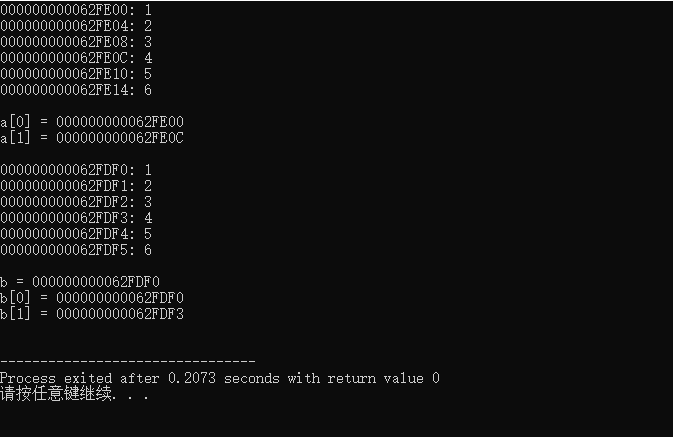
回答问题
1.是,四个字节
2.是一样的
3.是,一个字节
4.是一样的
5.a[0]的值为a[0,0]的值,a[1]的值为a[1,1]的值
b[0]的值为b[0,0]的值,b[1]的值为b[1,1]的值
实验任务2
实验代码
#include <stdio.h>
#include <string.h>
#define N 80
void swap_str(char s1[N], char s2[N]);
void test1();
void test2();
int main() {
printf("测试1: 用两个一维维数组,实现两个字符串交换\n");
test1();
printf("\n测试: 用二维数组,实现两个字符串交换\n");
test2();
return 0;
}
void test1() {
char views1[N] = "hey, C, I hate u.";
char views2[N] = "hey, C, I love u.";
printf("交换前: \n");
puts(views1);
puts(views2);
swap_str(views1, views2);
printf("交换后: \n");
puts(views1);
puts(views2);
}
void test2() {
char views[2][N] = {"hey, C, I hate u.", "hey, C, I love u."};
printf("交换前: \n");
puts(views[0]);
puts(views[1]);
swap_str(views[0], views[1]);
printf("交换后: \n");
puts(views[0]);
puts(views[1]);
}
void swap_str(char s1[N], char s2[N]) {
char tmp[N];
strcpy(tmp, s1);
strcpy(s1, s2);
strcpy(s2, tmp);
}
实验结论
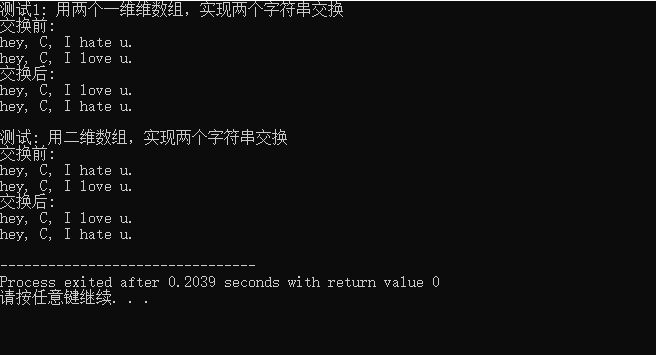
回答问题
views1为"hey, C, I hate u."的首地址,views2为"hey, C, I love u."的首地址,输出时直接输出views1,views2即可,
views[0]为"hey, C, I hate u."的首地址,views[1]为"hey, C, I love u."的首地址,
views1为一个整体,views[0]为一个整体
实验任务3.1
实验代码
#include <stdio.h>
#define N 80
int count(char x[]);
int main() {
char words[N+1];
int n;
while(gets(words) != NULL) {
n = count(words);
printf("单词数: %d\n\n", n);
}
return 0;
}
int count(char x[]) {
int i;
int word_flag = 0; // 用作单词标志,一个新单词开始,值为1;单词结束,值为0
int number = 0; // 统计单词个数
for(i = 0; x[i] != '\0'; i++) {
if(x[i] == ' ')
word_flag = 0;
else if(word_flag == 0) {
word_flag = 1;
number++;
}
}
return number;
}
实验结论
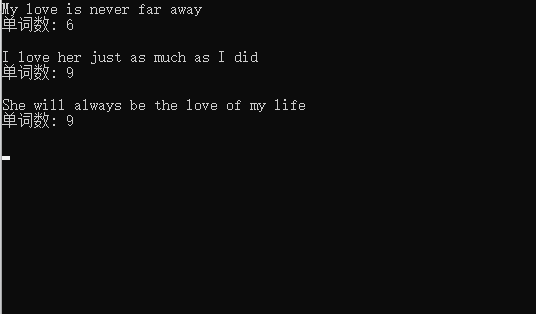
实验任务3.2
实验代码
#include <stdio.h>
#define N 1000
int main() {
char line[N];
int word_len;
int max_len;
int end;
int i;
while(gets(line) != NULL) {
word_len = 0;
max_len = 0;
end = 0;
i = 0;
while(1) {
while(line[i] == ' ') {
word_len = 0;
i++;
}
while(line[i] != '\0' && line[i] != ' ') {
word_len++;
i++;
}
if(max_len < word_len) {
max_len = word_len;
end = i;
}
if(line[i] == '\0')
break;
}
printf("最长单词: ");
for(i = end - max_len; i < end; ++i)
printf("%c", line[i]);
printf("\n\n");
}
return 0;
}
实验结论
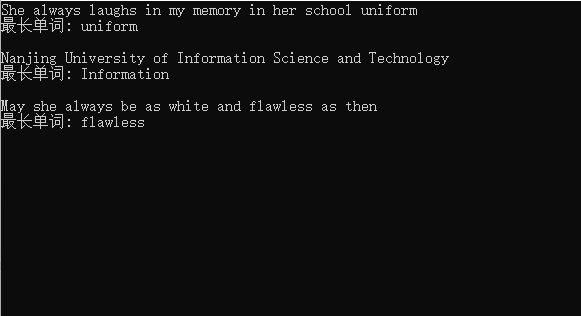
回答问题
可以引入 ctype.h 头文件,使用 isspace() 函数来判断是否是空格,使用 isalpha() 函数来判断一个字符是否是字母。
实验任务4
实验代码
#include <stdio.h>
#define N 5
void input(int x[], int n);
void output(int x[], int n);
double average(int x[], int n);
void bubble_sort(int x[], int n);
int main() {
int scores[N];
double ave;
printf("录入%d个分数:\n", N);
input(scores, N);
printf("\n输出课程分数: \n");
output(scores, N);
printf("\n课程分数处理: 计算均分、排序...\n");
ave = average(scores, N);
bubble_sort(scores, N);
printf("\n输出课程均分: %.2f\n", ave);
printf("\n输出课程分数(高->低):\n");
output(scores, N);
return 0;
}
void input(int x[], int n) {
int i;
for(i = 0; i < n; ++i)
scanf("%d", &x[i]);
}
void output(int x[], int n) {
int i;
for(i = 0; i < n; ++i)
printf("%d ", x[i]);
printf("\n");
}
double average(int x[], int n) {
int sum = 0;
for (int i = 0; i < n; i++) {
sum += x[i];
}
double average = (double)sum / n;
return average;
}
void bubble_sort(int x[], int n) {
int i, j;
for (i = 0; i < n-1; i++) {
for (j = 0; j < n-i-1; j++) {
if (x[j] < x[j+1]) {
int temp = x[j];
x[j] = x[j+1];
x[j+1] = temp;
}
}
}
}
实验结论
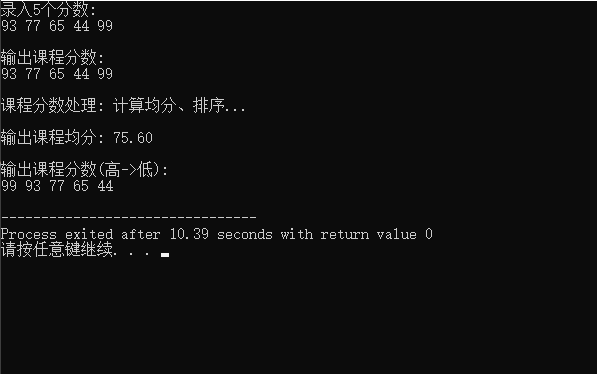
实验任务5
实验代码
#include <stdio.h>
#define N 100
void dec2n(int x, int n);
int main() {
int x;
printf("输入一个十进制整数: ");
while(scanf("%d", &x) != EOF) {
dec2n(x, 2);
dec2n(x, 8);
dec2n(x, 16);
printf("\n输入一个十进制整数: ");
}
return 0;
}
void dec2n(int x, int n) {
int result[100], i = 0;
while (x > 0) {
result[i] = x % n;
x /= n;
i++;
}
printf("%d进制数为:", n);
for (int j = i - 1; j >= 0; j--) {
if (result[j] < 10) {
printf("%d", result[j]);
} else {
printf("%c", 'A' + result[j] - 10);
}
}
printf("\n");
}
实验结论
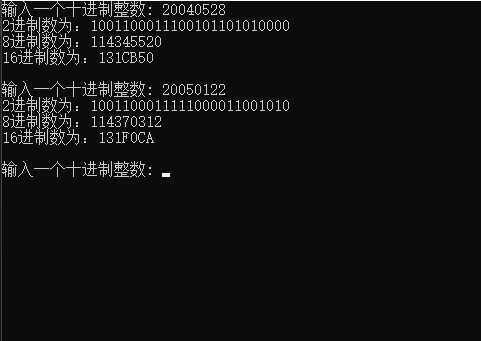
实验任务6
实验代码
#include <stdio.h>
#define N 100
#define M 4
void output(int x[][N], int n);
void rotate_to_right(int x[][N], int n);
int main() {
int t[][N] = {{21, 12, 13, 24},
{25, 16, 47, 38},
{29, 11, 32, 54},
{42, 21, 33, 10}};
printf("原始矩阵:\n");
output(t, M);
rotate_to_right(t, M);
printf("变换后矩阵:\n");
output(t, M);
return 0;
}
void output(int x[][N], int n) {
int i, j;
for (i = 0; i < n; ++i) {
for (j = 0; j < n; ++j)
printf("%4d", x[i][j]);
printf("\n");
}
}
void rotate_to_right(int x[][N], int n) {
int tmp[N];
for (int i = 0; i < n; i++) {
for (int j = n-1; j >= 0; j--) {
if (j == n - 1) {
tmp[j] = x[i][j];
} else {
x[i][j + 1] = x[i][j];
}
}
x[i][0] = tmp[n - 1];
}
}
实验结论
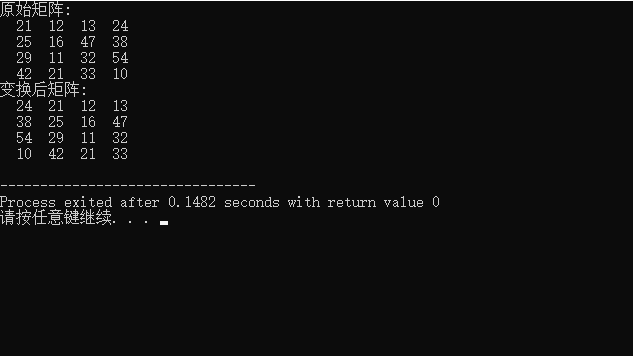
实验任务7.1
实验代码
#include <stdio.h>
#define N 80
void replace(char x[], char old_char, char new_char);
int main() {
char text[N] = "Life is a fucking movie.";
printf("原始文本: \n");
printf("%s\n", text);
replace(text, 'i', '*');
printf("处理后文本: \n");
printf("%s\n", text);
return 0;
}
void replace(char x[], char old_char, char new_char) {
int i;
for (i = 0; x[i] != '\0'; ++i)
if (x[i] == old_char)
x[i] = new_char;
}
实验结论
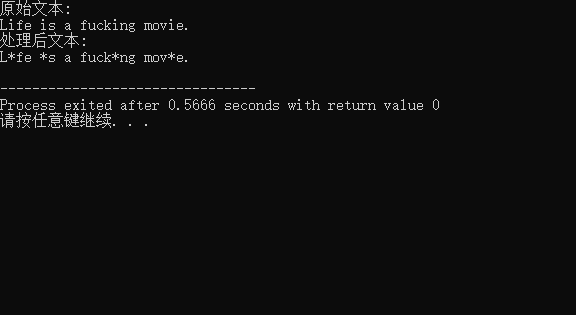
回答问题
1:在字符串中查找出指定字符并将其替换为另一字符
2:字符串结束符,当x[i]为\0时字符串刚好结束,此时字符串刚好被循环一遍。
实验任务7.2
实验代码
#include <stdio.h>
#define N 80
int main() {
char str[N], ch;
int i;
printf("输入字符串: ");
gets(str);
printf("输入一个字符: ");
ch = getchar();
printf("截断处理......");
i = 0;
while (str[i] != '\0') {
if (str[i] == ch)
str[i] = '\0';
i++;
}
printf("\n截断处理后字符串: %s\n", str);
return 0;
}
实验结论
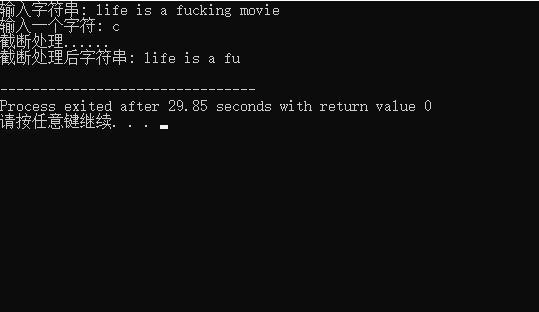
实验任务8
实验代码
#include <stdio.h>
#include <string.h>
#define N 5
#define M 20
void bubble_sort(char str[][M], int n);
int main() {
char name[][M] = {"Bob", "Bill", "Joseph", "Taylor", "George"};
int i;
printf("输出初始名单:\n");
for (i = 0; i < N; i++)
printf("%s\n", name[i]);
printf("\n排序中...\n");
bubble_sort(name, N);
printf("\n按字典序输出名单:\n");
for (i = 0; i < N; i++)
printf("%s\n", name[i]);
return 0;
}
void bubble_sort(char str[][M], int n){
int i, j;
char temp[M];
for (i = 0; i < n - 1; i++) {
for (j = 0; j < n - 1 - i; j++) {
if (strcmp(str[j], str[j+1]) > 0) {
strcpy(temp, str[j]);
strcpy(str[j], str[j+1]);
strcpy(str[j+1], temp);
}
}
}
}
实验结论
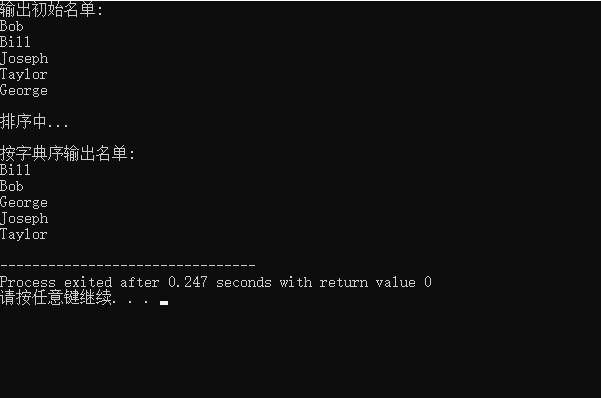



 浙公网安备 33010602011771号
浙公网安备 33010602011771号